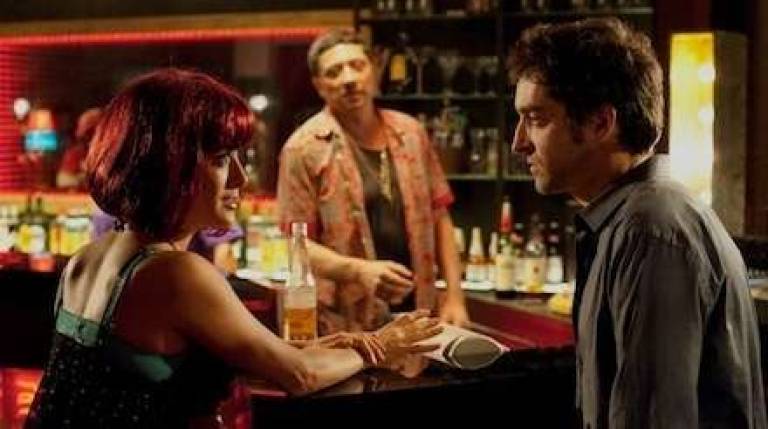Cinematic Royalty: Film Becomes Autobiography in Mathieu Demy's Debut Americano

Americano is a movie haunted by parents. In his feature debut, Mathieu Demy ? son of directors Jacques Demy and Agnès Varda ? directed, wrote, and stars in this film as Martin, a stunted Frenchman who must travel back to Los Angeles following the death of his estranged mother. Stuck at a crossroads in his relationship with girlfriend Claire (Chiara Mastroianni, scion of father Marcello and mother Catherine Deneuve), he picks up and heads to America to try and posthumously un-knot the ties that bind. Identity is a big question for Martin upon arrival, as he shifts from the European arrivals line to the U.S. Citizen return line at LAX. Still plagued by astonishment as how his mother could have essentially abandoned him (after living as a youngster in California, he and his father moved to France; Martin's mother stayed forever), Martin has lingering questions about who he is. And after being picked up by his mother's caretaker and friend, Linda (Geraldine Chaplin, famous daughter of ? naturally ? Charlie), Martin begins to unravel a hidden chapter of his mother's life. These clues lead him to Tijuana to hunt a down an enigmatic stripper named Lola, played by Salma Hayek in a rare raw performance for the typically calculating star. Hayek may have no famous parents, but once Lola enters the picture, Americano begins to follow in the footsteps of many famous film forebears ? and not just the expected heart of darkness film noir ancestors Americano so closely mimics in its formula-hewing second half (there are few surprises in store for Lola, Martin, or Luis, the thuggish club manager played by Carlos Bardem). Demy actually sticks even closer to home, evoking his father's Lola and Model Shop (Anouk Aimée played the character who would ultimately become Hayek's namesake here) as Martin enters further into Lola's world of smoke and mirrors. If his ideas as a writer feel a bit rote (the title could be I Never Sang for My Mother on Golden Pond, if one could find someone to translate that into French), Demy's performance never feels less than authentic. Martin is an untethered man who feels nothing ? a quite convincing portrait of functional depression ? and this trip, one that haunts and even emasculates him, is the jolt he needs to wake him up to life. Americano also cannot help but feel autobiographical. Visually, literally, we are watching Demy's own life. Martin recalls cloudy memories of his early years in Venice, which Demy presents through the use of his appearance as a child in his own mother's 1981 Documenteur. This possibly pretentious fusion of life and fiction, usually left in the hand of more seasoned filmmakers, may polarize purists but satisfy cineastes. Demy's movie is not a masterpiece, but it doesn't aim to be. What the auteur has created is a window into his soul. Americano portrays the artist as a young man as well as an adult. And he leaves it up to the viewer, in charting that path, to the connect the dots of his or her own journey.